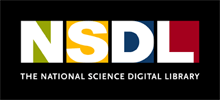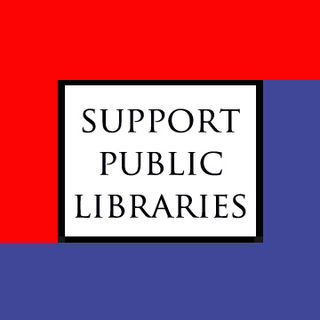
The United States' National Science Digital Library (NSDL) is an open-access online digital library and collaborative network of disciplinary and grade-level focused education providers operated by the Institute for the Study of Knowledge Management in Education. NSDL's mission is to provide quality digital learning collections to the science, technology, engineering, and mathematics (STEM) education community, both formal and informal, institutional and individual. NSDL's collections are refined by a network of STEM educational and disciplinary professionals. Their work is based on user data, disciplinary knowledge, and participation in the evolution of digital resources as major elements of effective STEM learning.
The American Library Association (ALA) is a nonprofit organization based in the United States that promotes libraries and library education internationally. It is the oldest and largest library association in the world, with 49,727 members as of 2021.

The Children's Internet Protection Act (CIPA) is one of a number of bills that the United States Congress proposed to limit children's exposure to pornography and explicit content online.
Universal Design for Learning (UDL) is an educational framework based on research in the learning sciences, including cognitive neuroscience, that guides the development of flexible learning environments and learning spaces that can accommodate individual learning differences.
E-Rate is the commonly used name for the Schools and Libraries Program of the Universal Service Fund, which is administered by the Universal Service Administrative Company (USAC) under the direction of the Federal Communications Commission (FCC). The program provides discounts to assist schools and libraries in the United States to obtain affordable telecommunications and internet access. It is one of four support programs funded through a universal service fee charged to companies that provide interstate and/or international telecommunications services.
Health advocacy or health activism encompasses direct service to the individual or family as well as activities that promote health and access to health care in communities and the larger public. Advocates support and promote the rights of the patient in the health care arena, help build capacity to improve community health and enhance health policy initiatives focused on available, safe and quality care. Health advocates are best suited to address the challenge of patient-centered care in our complex healthcare system. The Institute of Medicine (IOM) defines patient-centered care as: Health care that establishes a partnership among practitioners, patients, and their families to ensure that decisions respect patients’ wants, needs, and preferences and that patients have the education and support they need to make decisions and participate in their own care. Patient-centered care is also one of the overreaching goals of health advocacy, in addition to safer medical systems, and greater patient involvement in healthcare delivery and design.
The history of school counseling in the United States of America varies greatly based on how local communities have chosen to provide academic, career, college readiness, and personal/social skills and competencies to K-12 children and their families based on economic and social capital resources and public versus private educational settings in what is now called a school counseling program.

Children At Risk is a 501(c)(3) non-profit organization that drives changes for children through research, education, and influencing public policy. Founded in the year of 1989 in Houston, Texas and with an office opened in North Texas in 2011, the organization focuses on the well-being of children and educates legislators on the importance of solving children's issues while at the same time focusing on a variety of issues, and the primary issues are human trafficking, food insecurity, education, and parenting. Children At Risk also has a North Texas office in Dallas, Texas. Some of Children At Risk's previous primary issues were juvenile justice, mental health, and Latino children.
JourneyEd, along with its subsidiaries, sells academic software to members of the educational community in North America and Canada. Vendors such as Microsoft, Adobe, Corel, and others offer academic versions of software to students, faculty, staff, educational institutions, and public school districts. These academic versions of software are almost identical to their commercial versions in functionality, but offered at a lower price point to eligible buyers. Through a partnership with vendors and its Academic eStore Network of 15,000 websites, JourneyEd makes these titles available, and verifies academic buyers.
Knowbility is an American non-governmental organization based in Austin, Texas, working to support the independence and empowerment of people with disabilities by promoting the use and improving the availability of accessible information technology. Its mission is to create an inclusive digital world for people of all abilities. Knowbility's signature program is the Accessibility Internet Rally, a web-building competition that brings together volunteer web designers to create accessible websites for nonprofit organizations and artists that serve communities all over the world.
Connecting America: The National Broadband Plan is a Federal Communications Commission (FCC) plan to improve Internet access in the United States. The FCC was directed to create the plan by the American Recovery and Reinvestment Act of 2009, and unveiled its plan on March 16, 2010.

Science Buddies, formerly the Kenneth Lafferty Hess Family Charitable Foundation, is a non-profit organization that provides a website of free science project productivity tools and mentoring to support K-12 students, especially for science fairs. Founded in 2001 by engineer and high-tech businessman, Kenneth Hess, Science Buddies features STEM content and services to assist students and educators. Since its founding, it has expanded its original mission to provide teacher resources targeted for classroom and science fair use.

Public library advocacy is support given to a public library for its financial and philosophical goals or needs. Most often this takes the form of monetary or material donations or campaigning to the institutions which oversee the library. Originally, library advocacy was centered on the library itself, but current trends show libraries positioning themselves to demonstrate they provide "economic value to the community."
Public libraries in the American Colonies can be traced back to 1656, when a Boston merchant named Captain Robert Keayne willed his collection of books to the town.
Librarianship and human rights in the U.S. are linked by the philosophy and practice of library and information professionals supporting the rights enumerated in the Universal Declaration of Human Rights (UDHR), particularly the established rights to information, knowledge and free expression.

Edsby is an educational technology company headquartered in Toronto, Canada. It is the developer and publisher of the Edsby platform, a web-based K-12 learning management system (LMS) and analytics platform, and Unison, an educational data aggregation product.

The DO-IT Center is based at the University of Washington (UW) in Seattle, Washington. Founded in 1992, DO-IT’s mission is to increase the successful participation of people with disabilities in postsecondary education and careers, in STEM fields and careers, and in computing fields and careers throughout the U.S. It directs the national AccessSTEM program, and co-directs the national AccessComputing Alliance focused on engaging people with disabilities in computing fields.

The National Center for Women & Information Technology (NCWIT) is a 501(c)(3) nonprofit organization that works to increase participation of girls and women in computing. NCWIT was founded in 2004 by Lucinda (Lucy) Sanders, Dr. Telle Whitney, and Dr. Robert (Bobby) Schnabel. NCWIT is headquartered in Boulder, Colorado at the University of Colorado Boulder. Lucy Sanders, who was inducted into the Women in Technology International Hall of Fame in 2007, is the current chief executive officer.
ConnectEd is a United States Federal Government Initiative that aims to increase internet connectivity and technology in all public schools to enhance learning. The ConnectEd initiative is funded through Title IV Part A of the Every Student Succeeds Act (ESSA), which designates specific monies for the effective use of technology in schools. The 2016 National Education Technology Plan aligns with ConnectEd as a published action plan to meet these goals of technology integration and connectivity.
3C, also styled the Connected Commerce Council, is a Washington, DC-based small business advocacy organization. It receives significant funding from large tech firms such as Google and Amazon.







